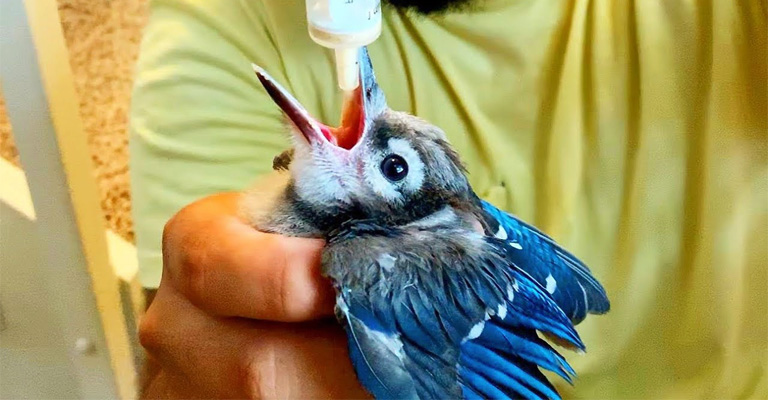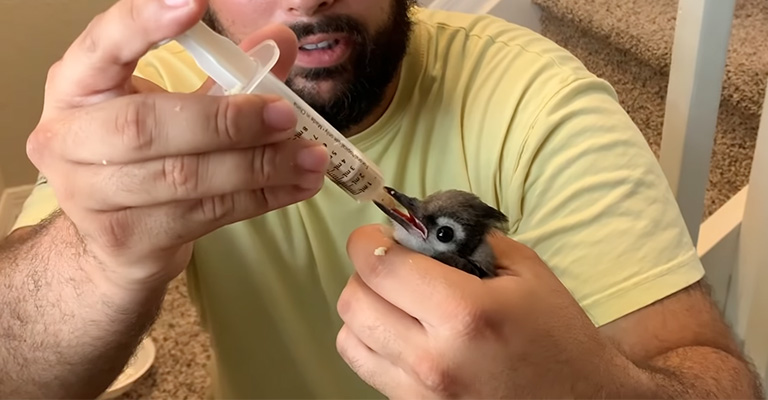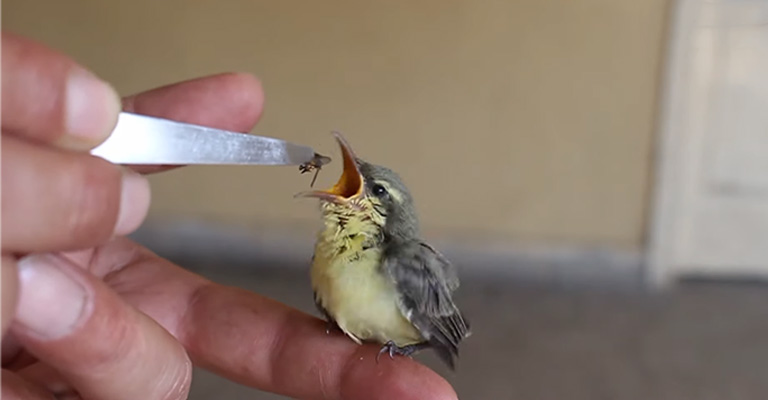While it might seem like an act of kindness to offer water directly to a bird by dripping it into its open mouth, there are important reasons to avoid this seemingly well-intentioned gesture.
So, why shouldn’t we drip water into a bird’s open mouth? Birds have a unique physiology that makes them highly sensitive to the introduction of foreign substances into their bodies.
The act of dripping water into a bird’s open mouth can disrupt the natural drinking and swallowing process, potentially leading to aspiration.
Aspiration occurs when water enters the bird’s airway instead of its digestive tract, which can result in choking, respiratory distress, and even fatal consequences.
In addition, birds require a specific balance of fluids and electrolytes, and offering water in an unregulated manner can disturb this delicate equilibrium.

Why Shouldn’t We Drip Water into a Bird’s Open Mouth?
Dripping water into a bird’s open mouth might seem like a helpful action, but it’s important to understand why it’s generally not recommended. Here are a few reasons to consider:
Risk of Aspiration
Birds have a unique swallowing mechanism that differs from mammals. Their trachea (windpipe) and esophagus (food tube) are close together in their throat.
Dripping water directly into their mouth could accidentally lead to water entering the trachea instead of the esophagus. This could cause aspiration, where water enters the lungs and potentially leads to respiratory issues or infections.
Stress and Fear
Approaching a bird with a direct water source can be stressful for the bird. Birds are naturally wary of unfamiliar situations and movements, and attempting to introduce water in this manner might cause unnecessary stress, potentially leading to injury or even death due to fright.
Natural Drinking Behavior
Birds have evolved to drink water in a specific way that suits their physiology. Most birds instinctively lift their heads to swallow water, allowing it to flow down their throats naturally.
Dripping water into their mouth disrupts this natural behavior and might not provide the same physiological benefits.
Lack of Control
Dripping water into a bird’s mouth can lead to an uncontrolled amount of water intake. Birds regulate their water intake based on their body’s needs, and forcing water into their mouth might result in overhydration, which could negatively impact their health.
Potential for Choking
If water is dripped too quickly or in excessive amounts, it might overwhelm the bird’s ability to swallow properly. This could lead to choking, discomfort, or even blockages in the throat.
Inaccurate Hydration Assessment
Birds are adept at regulating their hydration levels based on their specific needs. Dripping water into their mouth bypasses their natural drinking behavior, making it difficult to accurately assess how much water they actually require.
This could potentially lead to underhydration or overhydration, both of which can be detrimental to their health.
Discomfort and Trust Issues
Birds, especially wild ones, are naturally cautious of human interaction. Attempting to drip water into their mouth could cause them discomfort and erode any trust they might have in humans. This could complicate future efforts to help or care for the bird if needed.
Overall, it’s important to respect a bird’s natural behavior and consider its unique anatomy when providing water.
If you’re concerned about a bird’s hydration, it’s often better to provide a shallow dish of clean water in a quiet and familiar environment, allowing the bird to drink at its own pace.
If you believe a bird is in distress, it’s advisable to contact a local wildlife rehabilitator or veterinarian for guidance.
How to Properly Feed Water to Birds?

Properly providing water to birds involves creating a safe and inviting environment that aligns with their natural behaviors. Here’s how to do it:
Bird Bath or Dish
Place a shallow bird bath or dish in your yard or garden. Ensure it’s made of materials like ceramic, glass, or plastic that won’t leach harmful chemicals. The bath should have a gentle slope so birds can wade in comfortably.
Clean Water
Change the water regularly, preferably daily, to prevent the growth of harmful bacteria and mosquitoes. Use clean, fresh water that is free from any additives.
Placement
Position the bird bath or dish in a quiet and open area away from dense vegetation where predators might hide. Ensure there’s a clear line of sight for the birds to spot potential dangers.
Multiple Options
Consider having multiple water sources if you have a large garden or yard. This can prevent overcrowding and territorial disputes among birds.
Natural Design
Add stones or shallow rocks to the water to provide different depths for birds to perch on or wade into. This mimics natural streams and puddles where birds drink from in the wild.
Avoid Bird Feeders
While bird feeders are excellent for providing food, they’re not suitable for water. Water can quickly contaminate bird feeders, potentially leading to the spread of disease.
No Chemicals
Avoid adding any chemicals, detergents, or cleaning agents to the water. Birds are sensitive to chemicals and these substances could harm them.
Monitor Regularly
Observe the bird bath for bird activity and any signs of contamination. If you notice any sick birds, it’s best to temporarily remove the water source and clean it thoroughly before reintroducing it.
Winter Care
In colder climates, ensure the water doesn’t freeze completely. You can use a heated bird bath or regularly replace the water to provide a liquid source during freezing temperatures.
Be Patient
It might take time for birds to discover and start using the water source, especially if it’s a new addition. Be patient and let them get accustomed to it at their own pace.
By following these guidelines, you’ll be providing birds with a safe and natural way to access water, contributing to their well-being and helping them thrive in your environment.
What Not to Offer When Feeding Baby Birds?

Feeding baby birds requires special care and attention to ensure their proper development and health. Here are things you should avoid when feeding baby birds:
Cow’s Milk or Dairy Products
Do not offer cow’s milk or any dairy products to baby birds. Their digestive systems are not equipped to process lactose, which could lead to digestive issues and dehydration.
Processed Foods
Avoid giving processed or human foods, such as sugary snacks, salty foods, and heavily seasoned items. Stick to a diet that closely resembles their natural diet.
Bread and Baked Goods
Bread lacks the essential nutrients baby birds need. Feeding them bread could fill them up without providing the necessary nutrients for growth.
Fruit with Pits and Seeds
Avoid offering fruits with pits and seeds, as they can be a choking hazard for baby birds. Opt for seedless and finely chopped fruits.
Foods High in Fat or Salt
High-fat and high-salt foods are not suitable for young birds. These ingredients can upset their delicate digestive systems and lead to health problems.
Insects and Bugs from Unreliable Sources
If you’re feeding insects to baby birds, ensure they come from reliable sources. Insects from outdoors might carry parasites or harmful chemicals that can be detrimental to the birds’ health.
Large Pieces of Food
Avoid giving baby birds food that is too large for them to swallow comfortably. Choking hazards should be minimized.
Honey
Honey can contain harmful bacteria that is especially dangerous for baby birds. It’s best to avoid offering honey altogether.
Alcohol and Caffeine
Never give alcohol or caffeine-containing beverages to baby birds. These substances are toxic to them.
Medications or Supplements
Do not attempt to administer any medications or supplements without consulting a veterinarian experienced in avian care. Incorrect dosages or types of medications can be harmful.
Unfamiliar Foods
Stick to foods that are known to be safe and appropriate for the particular species of bird you’re caring for. Introducing unfamiliar foods abruptly can lead to digestive problems.
Force-Feeding Techniques
Avoid force-feeding techniques without proper knowledge and training. Incorrect feeding methods can lead to choking or injury.
Overfeeding
While it’s important to ensure baby birds receive enough nutrition, overfeeding can be harmful. Follow appropriate feeding guidelines for the bird’s age and size.
FAQs
Aspiration occurs when foreign substances, such as water, enter the respiratory system instead of the digestive system. Birds have a unique anatomy that makes them susceptible to this. Dripping water into their mouths can respiratory distress and infections.
Yes, dripping water directly into a bird’s mouth can cause stress. Birds are naturally cautious and can become fearful when faced with unfamiliar actions. This stress can lead to injury or even death due to the bird’s fright response.
Birds typically lift their heads to swallow water, allowing it to flow down their throats naturally.
This drinking behavior is adapted to their anatomy and physiology. Dripping water into their mouth disrupts this natural process.
Yes, there’s a risk of overhydration if water is forced into a bird’s mouth. Birds are capable of regulating their water intake based on their needs. Forcing water can lead to an uncontrolled amount of intake, potentially causing health issues.
Yes, dripping water too quickly or in excessive amounts could overwhelm a bird’s ability to swallow properly, leading to choking, discomfort, or obstruction in the throat.
Final Words
While the impulse to provide water directly to a bird in need is commendable, it’s essential to consider the potential harm that can arise from dripping water into its open mouth.
The intricate biology of birds makes them susceptible to aspirating fluids, which can have severe health repercussions.
By offering water through a shallow dish or bird bath, we respect their natural instincts and minimize the risk of unintended harm.
Ultimately, our goal should always be to support the well-being of these beautiful creatures by providing resources that align with their physiology and behavior.
Remember, respecting a bird’s natural behavior, providing a suitable water source, and avoiding unnecessary interventions are generally the best practices.
To truly help our avian friends, it’s best to provide fresh water in a shallow dish, allowing them to drink in a manner that aligns with their natural behavior and physiological needs.